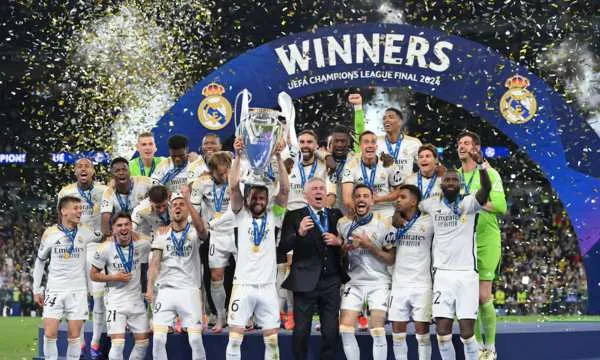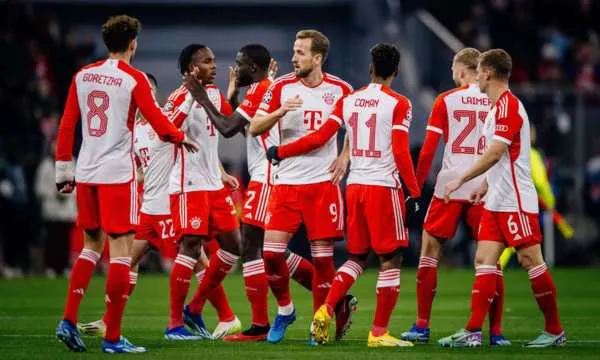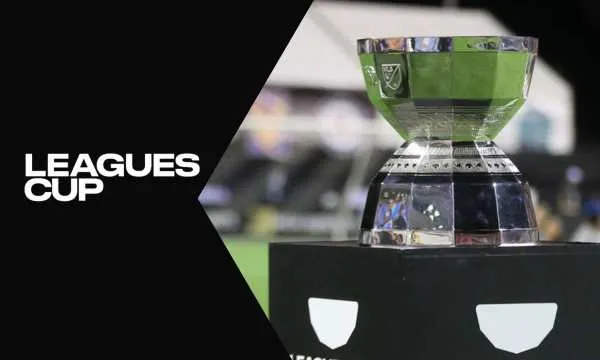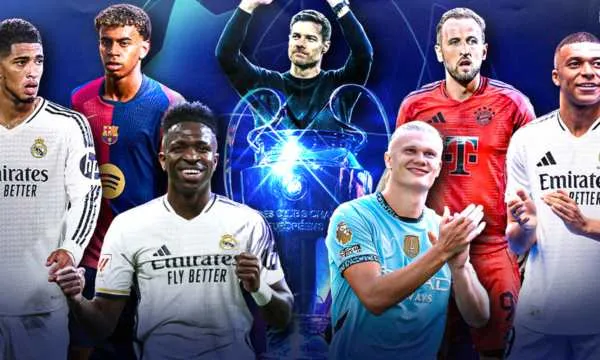Discover the football clubs that have dominated the global stage for decades.
Anúncios
World football is marked by institutions that transcend the sport itself, becoming true cultural and historical symbols.
These giants have conquered millions of hearts around the globe through memorable performances, historic titles, and unforgettable stars.
When discussing the greatest football clubs in the world, we consider not only trophies and achievements but also global impact, historical tradition, fan passion, and the ability to develop exceptional talent.
Each of these teams has unique characteristics that distinguish them on the international stage.
Real Madrid (Spain)
The Real Madrid story began in 1902 when students from the Institución Libre de Enseñanza established Madrid Football Club.
Two decades later, in 1920, King Alfonso XIII bestowed the prestigious “Real” (Royal) designation upon the organization, cementing its distinguished position within Spanish football.
From that moment forward, it has evolved into one of the most revered and celebrated football institutions globally.
With 15 UEFA Champions League titles, Real Madrid holds the absolute record in Europe’s most prestigious competition.
On the national stage, the club has secured 36 Spanish League championships, 20 King’s Cup victories, and numerous additional tournaments. Their achievements extend internationally, including 8 FIFA Club World Cup conquests.
Icons like Alfredo Di Stéfano, Ferenc Puskás, Zinedine Zidane, Ronaldo Nazário, Cristiano Ronaldo, and Karim Benzema have donned the famous white jersey.
Today, young talents like Vinícius Júnior and Jude Bellingham, alongside experienced veterans like Luka Modrić, keep the tradition of excellence alive.
The club remains the preferred destination for the world’s top football stars.

Flamengo (Brazil)
Established on November 15, 1895, as a rowing organization, Flamengo started its soccer operations in 1911 following a union with Flamengo Football Club.
It quickly established itself as one of the strongest forces in Brazilian and South American football. Today, it represents one of the football clubs with the largest fan bases in the world, estimated at over 40 million supporters.
The “Rubro-Negro” has won 8 Brazilian Championships, 4 Copa do Brasil titles, 3 Copa Libertadores trophies, and 1 FIFA Club World Cup.
The club’s 2019 Copa Libertadores run and following FIFA Club World Cup victory represented a glorious period for the organization. Flamengo additionally possesses 37 Carioca State titles, demonstrating its local supremacy.
Eternal idols such as Zico, Júnior, Leônidas da Silva, Romário, and Adriano made history wearing the sacred red and black shirt.
Currently, players like Gabigol, Arrascaeta, Bruno Henrique, and Pedro uphold Flamengo’s tradition of technical excellence.
The club remains a benchmark among Brazilian football clubs, combining historical legacy with modern international ambitions.
AC Milan (Italy)
Associazione Calcio Milan was established in 1899 by Herbert Kilpin, an English enthusiast devoted to soccer who aimed to create a team in the Italian metropolis.
Originally called Milan Cricket and Football Club, it rapidly emerged as a reference point in Italian soccer. Throughout over a century, it has cemented its status as one of the most triumphant football organizations in history.
With 7 UEFA Champions League titles, Milan ranks among the greatest winners of the European competition. Domestically, it has claimed 19 Italian Championships, 5 Coppa Italia titles, and 7 Italian Super Cups.
Its golden eras in the 1980s, 1990s, and 2000s set standards of tactical and technical excellence.
Legends such as Paolo Maldini, Franco Baresi, Roberto Baggio, Kaká, Andrea Pirlo, Clarence Seedorf, and Andriy Shevchenko made history at San Siro.
Today, young stars like Rafael Leão and Theo Hernández, along with veteran Olivier Giroud, keep the “Rossoneri” dreams alive. Milan remains a reference among European football clubs, seeking to reclaim its place as a continental powerhouse.
Bayern Munich (Germany)
Fußball-Club Bayern München was founded in 1900 by eleven players led by Franz John, initially as a breakaway from MTV 1879 München.
It started competing on makeshift pitches surrounding Munich but rapidly gained significance throughout German soccer. Currently, it represents one of the most structured and effective football organizations globally.
Boasting 6 European Cup victories and 33 Bundesliga crowns, Bayern has controlled German soccer for generations.
Its achievements include 20 German Cups, 9 German Super Cups, and 2 FIFA Club World Cups. The Bavarian consistency is remarkable, maintaining competitiveness across generations.
Legends like Franz Beckenbauer, Gerd Müller, Karl-Heinz Rummenigge, Lothar Matthäus, Oliver Kahn, Philipp Lahm, and more recently Thomas Müller, Manuel Neuer, and Robert Lewandowski have defined periods.
Currently, young talents like Jamal Musiala, Alphonso Davies, and Harry Kane represent the future. Bayern remains a global model of management and sporting success.

FC Barcelona (Spain)
Futbol Club Barcelona was founded in 1899 by Swiss-born Joan Gamper, who gathered football enthusiasts through a newspaper ad.
From its inception, the organization embraced Catalonian principles and evolved into an emblem of cultural and political belonging.
Beyond a team, Barça embodies a lifestyle for millions of supporters and continues as one of the most respected football institutions globally.
With 5 UEFA Champions League titles and 27 Spanish Championships, Barcelona has built a legacy of memorable triumphs.
Its 31 Copa del Rey, 14 Spanish Super Cups, and 3 FIFA Club World Cups demonstrate its consistency. The club’s possession based and short passing style has influenced generations of coaches and players.
Legends such as Johan Cruyff, Diego Maradona, Romário, Ronaldinho, Lionel Messi, Xavi, Andrés Iniesta, and Carles Puyol have immortalized their names in Barcelona’s history.
Today, young players like Pedri, Gavi, and Ansu Fati, along with veteran Robert Lewandowski, carry the torch forward. Barcelona remains a symbol of creative football and a pioneer of modern football philosophy.
Liverpool (England)
Liverpool Football Club was founded in 1892 by John Houlding after a dispute with Everton over the use of Anfield Stadium.
Initially, the club struggled to establish itself in English football but gradually built a strong reputation through hard work and determination. Today, it ranks among the most respected and feared football clubs on the planet.
With 6 UEFA Champions League titles and 19 English Championships, Liverpool boasts one of the richest histories in European football.
Its 8 FA Cups, 10 English League Cups, and 1 FIFA Club World Cup complete an impressive list of honors. The 1970s and 1980s were Liverpool’s golden decades, when the “Reds” dominated continental football.
Icons like Steven Gerrard, Kenny Dalglish, Ian Rush, John Barnes, Jamie Carragher, and more recently Mohamed Salah, Sadio Mané, and Virgil van Dijk have penned magnificent pages in the organization’s legacy.
Under Jürgen Klopp, players like Darwin Núñez, Luis Díaz, and veterans such as Jordan Henderson continue to uphold Liverpool’s ambitions. The club remains a model of passion and unity, with Anfield’s unique atmosphere inspiring millions.
Conclusion
These six powerhouses embody the true spirit of global soccer, each offering distinctively to the depth and variety of the game.
Their inheritances transcend championships and accolades, shaping generations of athletes, managers, and devoted followers.
The greatness of these football clubs lies in their ability to constantly reinvent themselves, remaining relevant across different eras and contexts.
Each club has developed its own identity, playing style, and philosophy that make it stand out internationally.
Regardless of change, these giants will continue to serve as benchmarks of excellence, passion, and tradition in world football.
FAQs
1. Which football club has the most UEFA Champions League titles?
Real Madrid tops with 15 UEFA Champions League victories, succeeded by AC Milan with 7.
2. How many supporters does Flamengo have in Brazil?
Flamengo has approximately 40 million fans, making it the club with the largest fan base in the country.
3. Which club created the “tiki-taka” style of play?
FC Barcelona created and promoted the “tiki-taka” approach, founded on ball control and brief, accurate passes.
4. Why is Liverpool known for the anthem “You’ll Never Walk Alone”?
The song became the club’s symbol after fans adopted it in the 1960s, representing unity and unconditional support.
5. What is the main characteristic of Bayern Munich’s management model?
Bayern is known for its responsible financial management, administrative stability, and consistent investment in player development.


